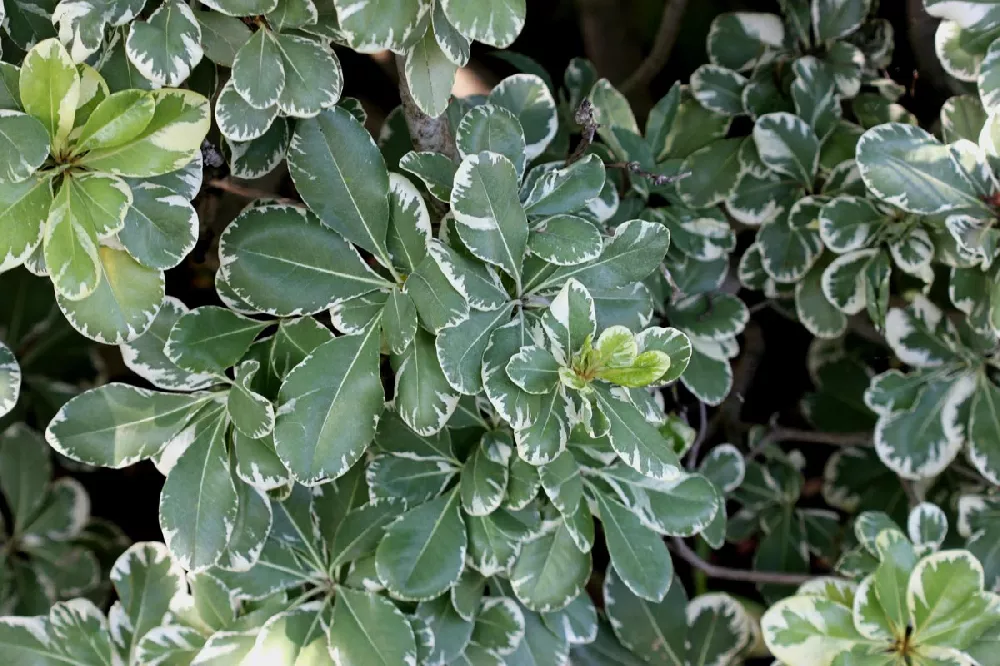- Home >
- Ornamental Plants >
- Variegated Pittosporum
Variegated Pittosporum for Sale - Buying & Growing Guide
- Ships in 1-2 days
- 1-Year Warranty Eligible
- Pots or accessories are not included unless specified in the product options.
Shipping Details:
Products shipped through FastGrowingTrees.com. Once your order is shipped, you’ll receive an email with a tracking number and estimated delivery date. Most orders will ship immediately.
If you would like to add some pizzazz to your landscape, the variegated pittosporum, Pittosporum tobira 'Variegata,' is ready to serve. This foundation plant offers far more than the standard green of boxwoods or arborvitae. It features leaves of an appealing sage green with creamy white margins. It can be left unpruned or pruned to a more formal hedge or topiary shape as desired. During warmer months, the shrub's white blossoms have an enchanting orange blossom fragrance that makes it a great choice to place near a patio, where the scent can be appreciated. This versatile plant makes for a great hedge, but it also can serve as a solitary specimen shrub in your front yard. It's easy to care for and disease- and deer-resistant. Here are a few more reasons to love the variegated pittosporum:
- Once mature, it tolerates drought-like conditions and needs little supplemental watering.
- The variegated pittosporum is tolerant of urban air pollution, which makes it a great choice to plant near roadways.
- Its long-lasting and attractive foliage is frequently used in florists' bouquets.
Plant Care
Sunlight

The variegated pittosporum needs partial to full sun. Make sure it has four or more hours of direct light each day.
Watering
During its first year, water your shrub weekly; once established, water when soil 3 inches down is dry.
Fertilizing

Apply a slow-release, balanced fertilizer formulated for landscape trees and shrubs in early spring.
Planting and Care
Planting instructions
Choose a spot for your pittosporum that gets at least four hours of direct light a day, with soil that drains well. Unpot the shrub, and tease out any encircling roots, which can girdle the tree and slowly kill it. Dig a hole that’s as deep as the root ball and twice as wide. Place the bush in the hole, spreading out the roots. Holding the bush upright and steady, fill in around the roots with topsoil, tamping down as you go to eliminate air pockets. Water thoroughly. Apply a 2- to 3-inch layer of an organic mulch, such as bark chips, to conserve moisture and hinder weed growth.
Watering and nutrients
During your shrub’s first year, water every few days or whenever the soil is dry. Once the plant is established and showing signs of robust new growth, you can taper back on watering. A mature pittosporum will only need supplemental watering in conditions that are very dry or drought-like. Fertilize in early spring with a balanced, slow-release product that’s designed for landscape trees and shrubs, such as a 10-10-10 formula.
Pollination
The small but fragrant flowers of the variegated pittosporum are attractive to pollinators such as bees, and pollination leads to small woody seed capsules, which eventually burst to release the seeds. It’s also common to propagate pittosporum shrubs through cuttings, which are treated with a root-promoting compound and planted in a potting mix to produce new plants.
Pruning
Prune your variegated pittosporum to remove dead, diseased, or damaged branches whenever you see them. Prune to shape the bush or control its height in late winter, before new growth starts in the spring. Left unpruned, pittosporum will take on an attractive rounded or pyramidal shape. It may be pruned, however, to form a hedge or into a more formal shape, although you should never remove more than one-third of the plant’s growth in a single year.
Pests and diseases
Some common insect pests to watch for include aphids, scale insects, and mealybugs. A healthy plant can usually withstand minor infestations. Consider releasing or encouraging beneficial insects, such as ladybugs, which eat aphids. The most common diseases seen on pittosporum plants are angular leaf spot, Southern blight, and root rot. These are fungal in origin. Fungicides may help, and so can avoiding overwatering. Water at the base of the plant, and try not to get the leaves wet.
Achieving maximum results
The variegated pittosporum is hardy down to 10 degrees Fahrenheit, but if you live in an area that sees colder weather, you can consider growing them in pots that are brought inside or protected from the cold during winter months. Choose a pot that’s about twice the size of the root ball with good drainage holes, and use a good-quality potting mix. Keep in mind that container-grown plants often need more watering and feeding than those that are grown in the ground, so check your shrub frequently to see if it needs water. It will probably stay smaller than the shrub’s usual maximum height of 6 to 8 feet, since the roots are constrained by the pot, but you can also prune to keep it to a more manageable size.
FAQs
How big does a variegated pittosporum get?
Where can I grow a variegated pittosporum?
When grown outdoors, the variegated pittosporum does well in USDA hardiness zones 8 through 11. This includes the southern parts of the U.S. and the western coastal regions up to the Pacific Northwest. It can handle temperatures down to 10 degrees Fahrenheit, and it can be grown in a container if your temperatures go below this.
How is this shrub best used in my landscape?
This versatile shrub can add a punch of color and texture wherever needed in a garden or landscape setting. The variegated leaves add interest in a mixed border, while the heavenly scented flowers make a good choice at a patio entrance or along a walkway, where the orange blossom scent can be appreciated. Because it tolerates pruning, the variegated pittosporum can also be used as a more formal low hedge at the border of a property, along a fenceline or in front of a house.
Compare Similar Products
You can't add more Product Name - Product size to the cart.
OK







